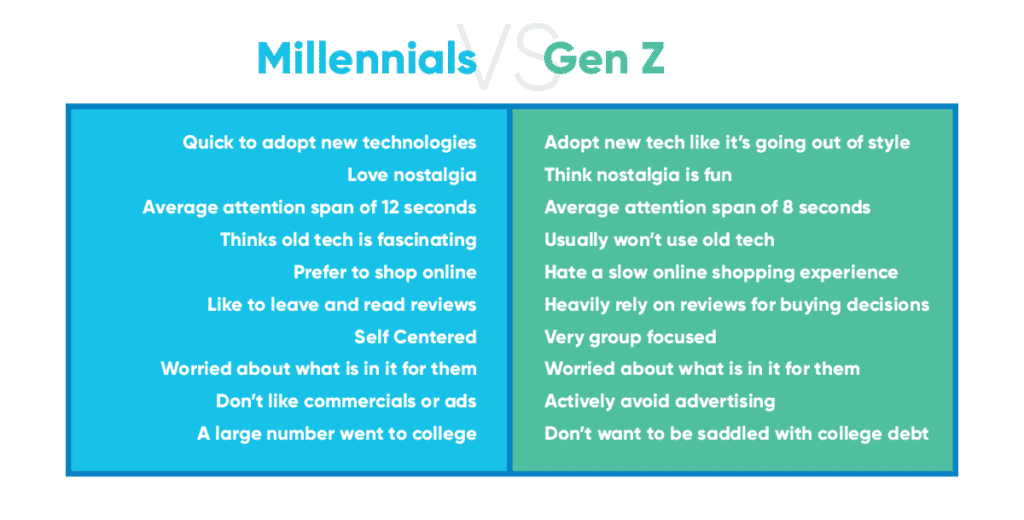The ABC of Marketing to Gen Z

Every generation gets its time in the spotlight and right now it’s Gen Z’s time to shine, but who exactly is Gen Z?
Gen Z, also known as Centennials or the iGen, follows Generation Y (Millennials) and refers to people born between the years 1995 and 2015. Gen Zers are known to be (among other things) competitive, social, environmentally conscious, and financially focused.
On a more personal level, Gen Zers enjoy expressing their individuality by openly voicing their social and political opinions. Even though they want to change how society thinks and reacts to things, they still value community in that they consider other people’s feelings and opinions.
Saying that Gen Z is tech-savvy would be an understatement. Unlike Millennials, Gen Zers have never known a time without technology such as, smartphones, internet access, and on-demand entertainment; this makes them tech-natives. Because of this, Gen Zers usually fit into one of the following categories:
- The Digital Orphans: children who are essentially being raised by technology. To clarify – their parents prefer giving them a smartphone or tablet to play on instead of spending time with them.
- The Digital Exiles: children whose families deliberately keep them offline as much as possible.
- The Digital Heirs: children whose parents embrace technology and help to guide their kids through the digital world.
Millennials vs. Gen Zers – Are they really that different?
 Source: Viral Nation
Source: Viral Nation
There are also a few other key differences between Millennials and Gen Zers:
Shopping preferences
Although Gen Zers usually research products online before making a decision, research shows that they value the unpredictable social interactions that come with shopping at brick-and-mortar stores. This preference ties in with their greater social media preference since these personal shopping experiences provide great social media material.
Millennials, on the other hand, prefer shopping online since it’s convenient and they can browse the product selection at their own pace and in the comfort of their own home.
Finance and debt
Studies show that Gen Zers are less likely to go to university because they don’t want to be burdened with student loans or debt in general.
When it comes to the workplace, Gen Z is also more competitive when it comes to their salary and job security.
Individualism
As mentioned earlier in the post, Gen Zers enjoy displaying their individuality and tend to be more outspoken than previous generations…they don’t want to be a part of “the herd”.
Compared to Millennials who like wearing branded clothing with the logos openly displayed, Gen Z prefers wearing simple colours such as black, white and grey to which they can add their own designs.
Marketing to Gen Z – What they want vs don’t want
BizCommunity says that by the year 2020, there will be a whopping 2.6 Billion Gen Z consumers globally which will make up about 40% of the world’s consumer population. 2020 is just around the corner so that change needs to happen soon.
Studies show that the average attention span of a Gen Zer is only around 8 seconds. That’s one third less than a Millennial’s 12 seconds, so the brand message needs to be communicated even faster and more clearly. Instagram and Snapchat are best suited for short punchy ads.
When marketing to Gen Z:
Do:
- Create personalised content – they want to feel as though the content was created especially for them.
- Include visuals like memes and emojis – Words alone won’t catch their attention.
- Stay active on all social media channels by posting pictures, polls, reviews, and user-generated content – they like sharing their opinions and participating in conversations.
- Create mobile-friendly content – they don’t want to wait for web pages to load.
- Respect online privacy – Gen Zers value their online privacy and tend to be wary of websites that ask personal questions.
- Be authentic – brands need to be transparent and honest when conveying their message or making a promise.
Don’t:
- Create lengthy, unnecessary introductions – the message needs to be communicated in 8 seconds or less.
- Neglect video content – videos are more likely to make them stop scrolling to watch the video.
- Ignore the lesser-known social platforms – while Facebook is still king, studies show that Gen Zers are moving towards less popular platforms like Reddit and Tumblr.
- Post the same content on every platform – since Gen Zers are active on multiple platforms, they’ll notice the duplication and ignore the message.
- Use clichés like “one time offer” and “flash sale”. These won’t work on Gen Z since they prefer marketing efforts to be unique, informative, persuasive, and entertaining.
To appeal to this tech-savvy generation, marketers need to target them in their natural habitat – the internet. Gen Zers are all about saving the environment and value unique experiences. They want to leave their mark on the world, so to appeal to this forward-thinking generation, brands need to focus on being both authentic, environmentally friendly and transparent.
Start your career, or if you are already working, boost your career with a leading internationally recognised qualification from the IMM Graduate School. Applications for 2020 are now open! Visit https://imm.ac.za for more information.

‘ …they don’t want to be burdened with student loans or debt in general’
Given that by 2020 these techno-native Gen Zers will make 40% of the world’s consumer population, I can predict a decline in credit sales since they do not want debt. (Something for TFG and other players to worry about?…) University/College life has such amazing experiences that these youngsters will miss out. I wonder how this will affect their lives.